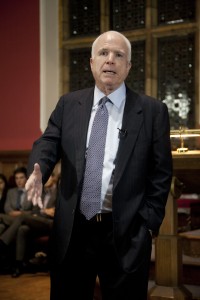
U.S. Senator John McCain at the Union
John McCain has some advice for Mitt Romney: be yourself, and if you win, call Bill Clinton.
McCain, the Senior Senator from Arizona best known as the 2008 Republican presidential nominee, addressed a full chamber at the Oxford Union on October 10th in an event co-hosted by the Union and the PPE society. The event took the form of a short talk followed by a question and answer session.
McCain—who was held as a Prisoner of War in Vietnam for six years— is well known for his hawkishness, and he spent much of his talk advocating military intervention in the Middle East.
“We live in an exciting and dangerous world full of perils and opportunities— the most exciting and dangerous time since the Cold War,” he said. But he fears that radical Islamists could subvert the tide of change for their own extremist purposes.
Without aid from America and its allies, McCain warns that Syria could endure “an extended stalemate, a massacre, for months.”
“We’re not giving the people who are standing up for their rights the assistance that it is our obligation to give,” he said. He sees the death of the U.S. ambassador and three U.S. citizens in Benghazi as just the latest reason for U.S. intervention.
“We are now finding out it was an orchestrated plan affiliated with Al Qaeda, not a spontaneous reaction to a hateful video,” he said. “To blame it on a video is an absolute misunderstanding of what is going on.”
“I don’t want American and British boots on the ground,” he said, “but I want us to supply them with weapons with which they can defend themselves.”
He spoke of visiting a Syrian refugee camp and meeting women who had been gang-raped and mothers whose children had been killed by Bashar al-Assad’s troops.
“For us to stand by and let this happen is unconscionable,” he said.
“Is there any case in which you wouldn’t reflexively advocate American military intervention?” asked one audience member, to a round of applause.
As for solving the Israeli-Palestinian conflict, McCain believes the person for the job is Bill Clinton.
“If Romney is elected, I’d hope that the first thing he would do would be to call Bill Clinton and have him bring these parties together,” said McCain. “Nobody knows his issues like Bill Clinton does.”
Unsurprisingly, McCain fielded many questions about the U.S. presidential elections. McCain admitted that until the October 3rd debate between Obama and Romney, he was not optimistic about his party’s chances.
“The debate turned everything on its head,” said McCain. “The President wasn’t on his game. I know from personal experience that the President is an excellent debater.”
Asked if he had any advice for Romney, McCain offered these words: “Try not to be somebody who you’re not.”
“Mitt is a very decent person with a wonderful, loving wife and five sons, but he doesn’t have to be the kind of guy you want to go for a beer with.”
“That’s my advice,” said McCain. “And by the way, he hasn’t asked for it.”
Although Romney may be a few points ahead, the polls are fluctuating on a daily basis, and the Senator warned against making assumptions about the outcome. “This thing is far from over,” he said. “We could be up late on the night of November 6th.”
McCain criticised the campaigns’ reliance on donations from corporations. “The system is now so, so terrible,” he said. He blamed the Supreme Court’s 2010 ruling to allow unlimited independent political expenditure by corporations and unions on the grounds of free speech, calling it their “worst decision ever.”
“They said money is free speech. Since when is money free speech?” asked McCain. “Money is money.” Under the current system, the average citizen does not have the same voice as a big contributor. What does an inundation of attack ads add to the conversation, asked McCain, who has sponsored legislation seeking to limit organisations’ contributions to political parties.
McCain concluded his talk with a plea to students to consider going into public service.
“You are the future. I am the past,” said McCain, who celebrated his 76th birthday in August. He earned a standing ovation— not bad, coming from a liberal audience that is largely hostile to his party’s views. (187 people “like” the “Oxford University for Obama” Facebook page, compared to only 20 who “like” the “Oxford Republicans Abroad” page.)
Students were struck by the contrast between his portrayal as distant and uncompromising during the 2008 campaign and the personable, even humorous demeanour he displayed at the Union. He even joked about his 2008 loss:
“After I lost the election in 2008, I slept like a baby— I’d sleep for two hours, then wake up and cry.” Audience members were also surprised to hear him praise Democrats and even criticise America’s two-party system.
“I thought he was a lot more dynamic and moderate than I expected,” said Katy Fallon, a third-year studying English at Keble. “While I don’t agree with all of his politics, I really developed an admiration for him as a person.”
For more Oxonian Globalist coverage and comment on the US Election:



